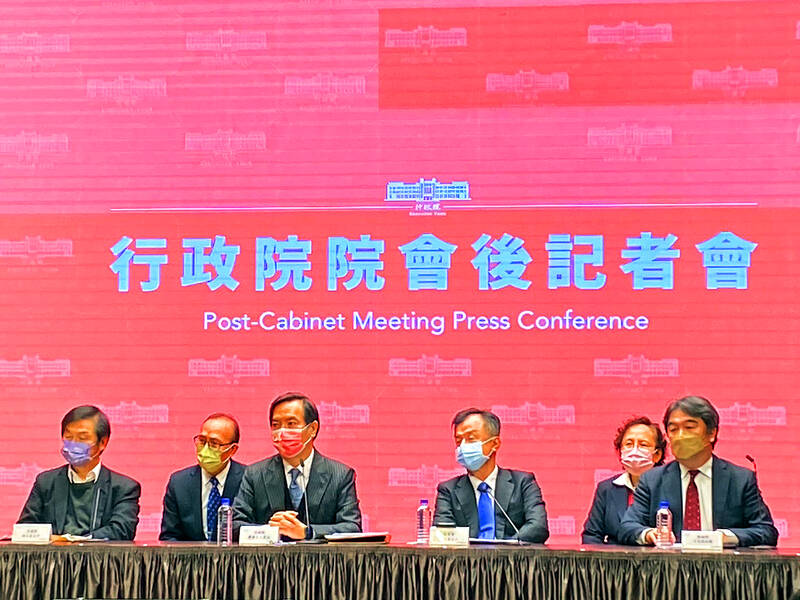The Executive Yuan is delaying a decision to ban TikTok nationwide as government departments are examining the feasibility of such a measure, spokesman Lo Ping-cheng (羅秉成) said yesterday at a weekly news conference.
Lo made the comment in response to a question about reports that the Cabinet is seeking to outlaw the popular Chinese app.
The short video platform owned by China-based ByteDance Co (字節跳動) has sparked national security fears in many countries.

Photo: Chung Li-hua, Taipei Times
FBI Director Christopher Wray last month said that the app is a threat to US security.
Officials are studying the legal ramifications of a ban, and whether measures adopted by other countries have been successful, Lo said.
The Executive Yuan is not directing a policy decision, and is waiting for feasibility studies to be concluded, he said.
The Cabinet has assembled a task force to ensure that a 2020 prohibition on government offices from using Chinese social media platforms, including TikTok, is being adhered to, Lo said.
The task force is additionally to study the effects of Chinese-owned social media apps being used nationwide, he said.
The Ministry of Education has been conducting a drive to raise public awareness of the possibility that TikTok could be used by Beijing to spread disinformation and wage cognitive warfare against the country, in addition to its negative effects on children’s well-being, Lo said.
Taiwan’s ban on government workers’ use of TikTok is in line with actions taken by other countries, he added.
India is the only country to impose a nationwide ban on TikTok, although its efficacy remains unknown, Lo said.
“More discussion and data gathering is required before we can conclude that a ban would work, and to know whether other countries have achieved their intended results,” he said.
“Any prohibition or regulation that can affect the freedoms and lives of Taiwanese must be weighed carefully by the government,” he said.
When asked if a TikTok ban would be discussed at the Executive Yuan’s Boxing Day cybersecurity conference, Lo said that the event participants would discuss cybersecurity threats in general, including those posed by other Chinese platforms.
Social media users in India have been able to bypass the block with a virtual private network, or by changing the region settings on their phones, which is an issue being studied by Taiwan’s representative office in India, a person familiar with the matter said.
The government in Taipei faces a greater number of legal constraints in its regulatory powers than India does, the person said.

Taiwan is stepping up plans to create self-sufficient supply chains for combat drones and increase foreign orders from the US to counter China’s numerical superiority, a defense official said on Saturday. Commenting on condition of anonymity, the official said the nation’s armed forces are in agreement with US Admiral Samuel Paparo’s assessment that Taiwan’s military must be prepared to turn the nation’s waters into a “hellscape” for the Chinese People’s Liberation Army (PLA). Paparo, the commander of the US Indo-Pacific Command, reiterated the concept during a Congressional hearing in Washington on Wednesday. He first coined the term in a security conference last

Prosecutors today declined to say who was questioned regarding alleged forgery on petitions to recall Democratic Progressive Party (DPP) legislators, after Chinese-language media earlier reported that members of the Chinese Nationalist Party (KMT) Youth League were brought in for questioning. The Ministry of Justice Investigation Bureau confirmed that two people had been questioned, but did not disclose any further information about the ongoing investigation. KMT Youth League members Lee Hsiao-liang (李孝亮) and Liu Szu-yin (劉思吟) — who are leading the effort to recall DPP caucus chief executive Rosalia Wu (吳思瑤) and Legislator Wu Pei-yi (吳沛憶) — both posted on Facebook saying: “I

The Ministry of Economic Affairs has fined Taobao NT$1.2 million (US$36,912) for advertisements that exceed its approved business scope, requiring the Chinese e-commerce platform to make corrections in the first half of this year or its license may be revoked. Lawmakers have called for stricter enforcement of Chinese e-commerce platforms and measures to prevent China from laundering its goods through Taiwan in response to US President Donald Trump’s heavy tariffs on China. The Legislative Yuan’s Finance Committee met today to discuss policies to prevent China from dumping goods in Taiwan, inviting government agencies to report. Democratic Progressive Party Legislator Kuo Kuo-wen (郭國文) said

Sung Chien-liang (宋建樑), who led efforts to recall Democratic Progressive Party (DPP) Legislator Lee Kun-cheng (李坤城), was released on bail of NT$80,000 today amid outcry over his decision to wear a Nazi armband to questioning the night before. Sung arrived at the New Taipei District Prosecutors’ Office for questioning in a recall petition forgery case last night wearing a red armband bearing a swastika, carrying a copy of Adolf Hitler’s Mein Kampf and giving a Nazi salute. Sung left the building at 1:15am without the armband and covering the book with his coat. Lee said today that this is a serious